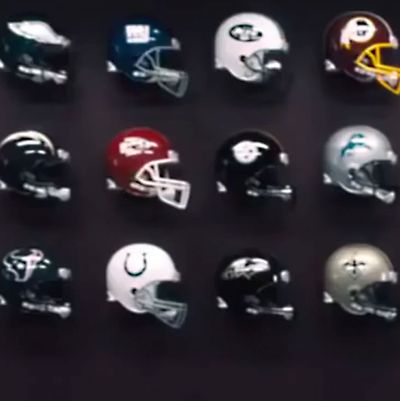
How do you take on one of the biggest institutions in America and come away unscathed? If you’re the makers of Concussion, which opens Friday, you go right at it. In the movie, Will Smith plays Dr. Bennet Omalu, a Nigerian doctor who discovered chronic traumatic encephalopathy, better know as CTE, the brain disease caused by concussive and subconcussive hits. While CTE affects athletes in any sports where head trauma is common, it’s become a particularly contentious point in football, what with all its head-battering. Concussion, as the name suggests, is unrelenting in its depiction of Omalu’s quest to raise awareness of the growing epidemic, particularly in the way it portrays the NFL as an organization not just resistant to change, but one actively covering up a known problem.
Yet just as fascinating as the accusations the movie leveled against the NFL is the ubiquity of official NFL trademarks throughout the movie. Scenes are set in the League offices, with the shield logo prominently displayed. Actual game footage is regularly shown. Official team names and logos are visible throughout. The National Football League is notorious for keeping a tight rein on how the organization and the sport are portrayed and perceived by the public. So how did a major motion picture, starring one of the world’s biggest movie stars, get away with using the League’s trademarks and materials in a film that casts it in the worst-possible light?
At last week’s New York premiere for Concussion, we spoke with the film’s director, Peter Landesman, about how they worked around the League. “There was no communication or relationship with the NFL,” he explained. “Originally, I was going to shoot all the football myself, and then I decided there was no way for me to approximate how beautiful the game was. So I went to the studio and said, ‘What I want to do is use real footage, real logos, and the NFL logo. The studio came back and said, ‘We got your back. We’ll protect you. Do whatever you want.’”
Emails discovered by the New York Times during the Sony leak suggest that the studio’s lawyers also made a significant effort to keep anything potentially litigative out of the film. Producer Giannina Scott confirmed the studio’s support, and the lengths the Concussion team went to in order to protect themselves — they were careful to make sure there was nothing, factually, with which the NFL could find fault. “We had great lawyers,” said Scott. “And we checked every fact, so that there was no way we can be discredited.”
With the film just a week from release, Landesman seems confident that they are in the clear. “We would know if they were going to make it a problem by now,” he explained. “But had they wanted to, we’re protected by fair use and the First Amendment, and if they wanted to bring that to the Supreme Court, they’re welcome to.”
The NFL has been quiet on all fronts in advance of the film’s release (both the League and the Steelers, the team featured most prominently in the film, didn’t respond to Vulture’s requests for comment), though ads for Concussion have run during NFL games, such as the Lions-Eagles Thanksgiving Day tilt. “It’s actually pretty jarring coming off a game to see these promos that are very powerful,” said Bob Costas, a NBC sportscaster who has covered football for over three decades, to Vulture. “The NFL hasn’t raised any objection. I don’t think they’re going to fight the movie very much, except to say — and there’s some truth in this — that even if they came to it late, they’re doing everything they can now to make an inherently dangerous game safer.”

